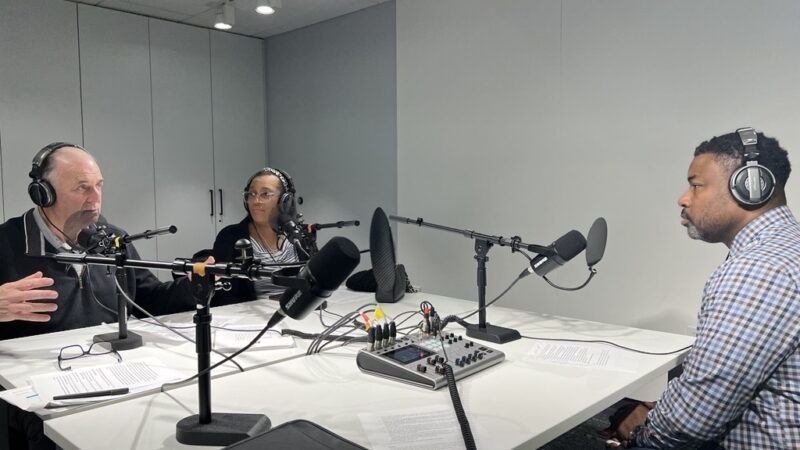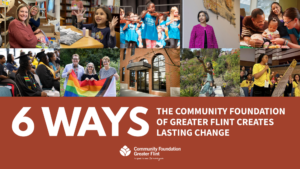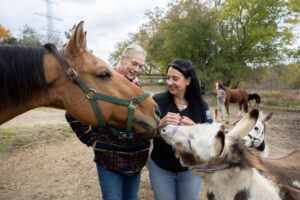
A recent episode of the Philanthropy Speaks Podcast spotlights a powerful conversation featuring CFGF President & CEO Dan Kildee, community advocate and nurse Tarnesa Martin ("Nurse T"), and host Moses Bingham, CFGF Director of Strategic Initiatives. Together, they open up about mental health struggles and the far-reaching impact of gun violence in our community.
Dan Kildee shares his personal journey with mental health and how the effects of gun violence have shaped his life, offering insight into the resources and strategies that have supported his healing. Nurse T draws on her experience at Hurley Medical Center, highlighting community mental health trends and professional resources available.
Below are highlights from the conversation. You can listen to the full podcast here.
Content Warning: This article discusses topics related to suicide, self-harm, mental health, gun violence, and death, which may be distressing for some readers. Reader discretion is advised.
I thought I understood. I didn’t.
Moses Bingham: Dan, what shaped your personal understanding of mental health?
Dan Kildee: You know, my first job was at the Whaley Children’s Center—working with the most traumatized children in our society. That opened my eyes to mental health and the issues that surround mental health treatment. It led me to believe that I kind of understood it—but of course, you don’t really know what folks go through until we go through something really serious and traumatic ourselves. Just about a year ago, my youngest brother was shot and killed by my nephew, by his son. His son had been experiencing a lot of difficulty on his own. He had substance abuse issues and other mental health issues. As a family member, that trauma was something I was not prepared for.
I’ll just never forget the morning I was in Washington, D.C — I was still a member of Congress then—when the Sheriff called me and told me what had taken place. It struck me in that moment that my life had changed forever. It’s the most painful thing I've ever experienced, and it’s still painful. I still need help, and I’m happy to talk about that.
Moses Bingham: How did you care for your mental health during that time?
Dan Kildee: I was fortunate, strangely, ironically, that at the point in time that my brother was killed and we experienced this trauma, I was already receiving mental health care because of another experience I had. When I was a member of Congress, I was one of the members who got trapped when thousands of people came and attacked the Capitol. I went through post-traumatic stress. I got connected to Dr. Jim Gordon, a mental health professional. When my brother was killed, it gave me an immediate place to take some of that pain and try to process it. I attribute the fact that I can talk about it to how I got help when I needed it. I worry about folks who don’t realize that it’s often natural to have a response to traumatic events. It’s almost impossible for all of us to process them just by the strength of our own will. We need help. I know I did, and I’m glad I got it and continue to get it.
The one thing that I have learned is you can’t change the facts, but you can manage how you respond and navigate this new world. The world looks different to me now than it did thirteen months ago. I learned techniques that I use regularly, like simple breathing techniques that allow me to minimize the physical manifestation of anxiety caused by the trauma.
How can we put in the work to take care of ourselves?
Moses Bingham: Nurse T, from your perspective, what do you see in the community regarding mental health?
Nurse T: What I see in the community is a lot of fear. I see a lot of shame. I see a lot of hurt. And I see a lot of people asking the question: “Why me?” I see a lot of people not understanding the “whys” when it comes to mental health. And family members often don’t know how to separate the person from the illness. They take things personally when a loved one withdraws or struggles.
On some occasions, I’ve changed the term to “mental fitness.” How can we put in the work to take care of ourselves, go through the process, and not be afraid to seek out therapy to become that better version of you?
Moses Bingham: What has your mental health journey entailed?
Nurse T: I remember one thing that really impacted me with gun violence and suicide. I had a friend that loved her husband dearly, and they got divorced—and she died by suicide using a gun. A lot people didn’t understand how you could relate or resort to something like this. Years later, I ended up in the same predicament. I ended up going through a divorce and feeling like all was lost. And I thought about her. I had to make a decision, and I made the decision to pull through, respond, and process the trauma.
I wrote a book, “All is Not Lost.” I think about how I didn’t have a diagnosis of a mental illness. It’s why I’m passionate about the people that get hit with untreated, undiagnosed trauma. They’re afraid to call for help when their whole world was ripped apart.
And it’s interesting, because when you think about working at a Number One Trauma in the ER, we do everything we can do put them on the journey to get them back. If they fall from a tree and break legs, surgeons are on board. We do everything to get them back to that healthy, physical state. But when somebody has mental health trauma, we need to do the same thing. We need to all be on board.
To break the chain of violence, we have to deal with mental health.
Moses Bingham: How does mental health tie into gun violence and safety? What does it take for us to solve these issues with the community violence interruption approaches we take?
Dan Kildee: There’s an old saying: hurt people hurt people. To break the cycle of violence, we have to deal with mental health. If that trauma is not addressed, it doesn’t just go away—it can come out and create a person who is so angry, they don’t know how to direct it. If we think about not just the pattern of gun violence, but violence in general, a lot of it is because there was an event that wasn’t addressed in somebody’s life. I think about the kids I used to work with at Whaley Children’s Center. I didn’t have to read their files to realize that it’s pretty likely that their parents were abused. There’s this chain of events that can take place. We’re focusing on a lot of interventions that deal with violence, but one of them is to deal with the trauma, to try to minimize the next event that might take place.
Nurse T: When people feel safe in their environment and have access to more mental health resources, well-being improves. I think one way to break the chain is to put programs, safe spaces, and opportunities in place before the chain connects. How can we start being proactive? It’s through putting measures in place. We’re always breaking the chains. Let’s not even let the chains connect.
Your health matters, too.
Nurse T: Your health matters, too. A lot of times we are busy taking care of other people, but it’s not selfish to take care of you. I would like to give the community the permission today, for all of us, to start taking care of ourselves. And all is not lost. You can still bounce back, heal, and win. You have an opportunity to become a better version of yourself. But activating that healthcare power starts with you.
Dan Kildee: It's normal, not abnormal, to have a response to trauma that is disorienting or scary. It doesn’t mean that there is something wrong with you. It means you’re a human being. I think this is an important message for everybody: give yourself a break and realize that the response you're having—that tension, stress, anxiety, whatever it is—is normal. We’ve just got to find the resources to deal with it.




